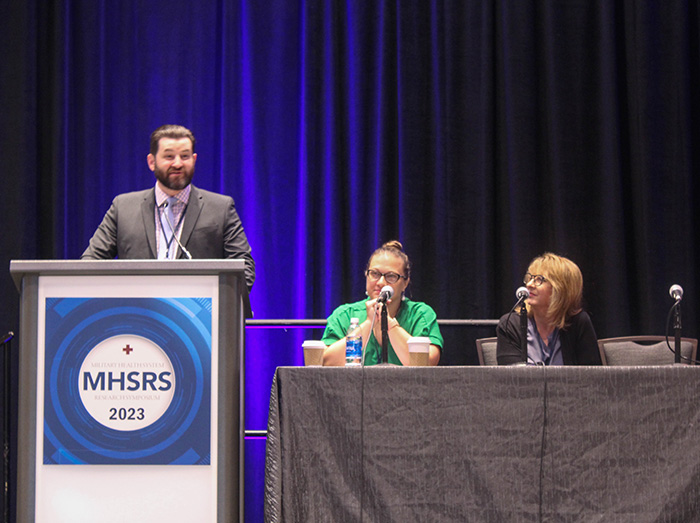Researchers say 'Warfighters Must Train like They Fight,' Emphasizing Mental Resilience During MHSRS

Nearly all military physical and field training exercises can enhance mental toughness and physical endurance, which researchers at the U.S. Army Medical Research and Development Command believe can prepare Warfighters for the future, they explained during a session on the final day of the 2023 Military Health System Research Symposium on August 17, 2023.
One future asset in testing is Full Dive Virtual Reality software that can help prepare for real-world battlefield scenarios by providing immersive experiences, according to Susannah Knust, a research psychologist at the U.S. Army Medical Research and Development Command's Walter Reed Army Institute of Research.
"We want to see how close it is for Warfighters and what they remember," said Knust.
Knust emphasized FDVR is not limited to sight. It allows for a fully immersive experience of physical stress responses to typical training environments like sweat and exhaustion. Hence, proving how the integration of psychological skills and strategies to enhance cognitive performance in an FDVR platform optimize medical skills, resilience, readiness and well-being in tactical combat casualty care.
"We want them to be learning, thinking through what they are experiencing, seeing what they can remember and hoping that their feedback will match up with live scenarios later down the line," said Knust.
Like FDVR's role in building Warfighter resilience, studies on brain endurance training also show promising evidence that positive cognitive interventions can improve high-level and sustained human performance, according to Bradley Fawver, a research psychologist at WRAIR.
"When I am doing exercise, my brain feels more active. I have the capacity to process information and think, where beforehand my brain felt more tired," said Fawver referencing participant feedback from BET studies.
For many years, the Army, Air Force and Navy have practiced forms of BET. However, until studies in 2015, developing formal BET interventions was limited due to systemic data collection challenges. Current BET studies now prove brain health optimization can lead to strengthened physical performance.
"Integration of mentally demanding tasks into physical training environments can allow individuals to become more resistant to physical fatigue," says Fawver.
Current approaches to BET include high-intensity interval training protocol designs that allow researchers to conduct evaluative cognitive training in the 30 to 60-second rest periods during physical training sessions, which are led by holistic health and fitness strengthening coaches.
"Service Members are not running on the treadmill just for PT anymore," Fawver said. "With Army Combat Fitness Testing, we want to make BET realistic that we can field into training environments."
As near-peer challenges continue to grow, so will the need for the development and integration of programs like FDVR and BET that enable Warfighters to maintain resilience in combat environments.
 An official website of the United States government
An official website of the United States government
 ) or https:// means you've safely connected to the .mil website. Share sensitive information only on official, secure websites.
) or https:// means you've safely connected to the .mil website. Share sensitive information only on official, secure websites.


